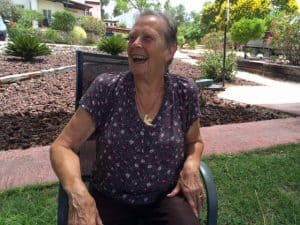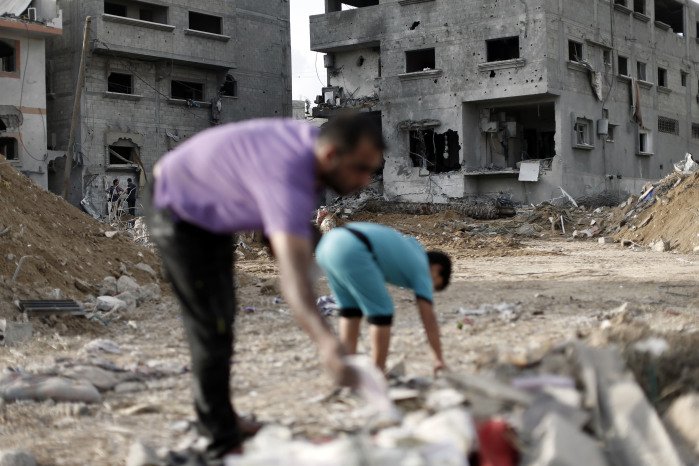NETIV HA’ASARA, Israel – When the rockets start falling and fighter jets buzz the skies, Roni Keidar and Maha Mehanna know they can lean on one another for comfort.
They are neighbors and close friends, and they call and text throughout the day and late into the night, checking to be sure the other has survived the latest round of fire between Israel and Hamas.
But despite sharing a war zone — and all the horror and fear that goes with it — they can’t visit now. Keidar is Jewish and lives in a small farming community in southern Israel. Mehanna is Palestinian and lives in the sprawl of Gaza City.
In one telephone call Saturday, a loud boom could be heard on the line, so close the two were not sure on which side of the border fence the explosive had fallen. “I think it’s your side,” Mehanna told her Israeli friend. “Hitting our side?”
Keidar paused a moment. “Yes,” she said. “I think you’re right.”
Theirs is a rare, almost impossible, friendship. Israelis and Palestinians in Gaza are more isolated from each other than ever before, and that has made the wartime bond between Keidar and Mehanna a subject of curiosity, scorn, suspicion and no small measure of amazement.
To some Israelis who have heard her voice on Israel’s news broadcasts, Mehanna is the face of Gaza — except that she remains faceless. In an interview Saturday, she agreed to speak openly about her friendship with Keidar and her views of the conflict, but she declined to allow photographs or video that might be circulated on the Internet. “I will speak from my heart, but these days are dangerous,” she said.
Keidar faces no such threat but still must contend with questions about how she can befriend the enemy.
“My daughter lost her best friend to a Qassam attack,” Keidar said Saturday above the incessant beep of a cellphone app that send out alerts each time a rocket is on its way. “She’ll say, ‘Mom, I’m proud of what you’re doing, but I’m just not there.’ ”

Nor are many Israelis, especially after five days of nonstop fire that have, if anything, only intensified calls within Israel for a ground assault aimed at routing Hamas, the Islamist militant organization that governs Gaza.
The U.N. Security Council voted unanimously Saturday to call for a cease-fire, but both sides have brushed off the pleas. Israel escalated its air assault Saturday, raising the death toll in Gaza to 151, including many women and children. More than 960 people have been wounded, according to the Gazan Health Ministry.
An early-morning airstrike by Israel leveled one of the oldest mosques in central Gaza, which the Israeli military alleges was being used to store rockets.
The Israeli air force also destroyed a small treatment center for the disabled, killing two women with severe disabilities and sending two others into intensive care. Standing among charred wheelchairs in the wreckage, the center’s director, Jamilah Eliwa, said, “Can anyone in the world explain to me why you would kill my patients?”
Lt. Col. Peter Lerner, an Israeli army spokesman, said authorities were looking into what he called a “clearly tragic” incident.
Israel said 18 Israelis were injured by rocket fire Saturday, including several people who were treated for shock. More than 85 rockets were fired toward Israel, though many were knocked down by Israel’s Iron Dome defense system. Israel reported rocket fire from across its northern border with Lebanon late Saturday night and responded with artillery fire.
Keidar, who describes herself as a proud Zionist, has lived in a cooperative farming community on a leafy bluff about 800 yards from the Gaza border for more than 30 years. For much of that time, Keidar could travel freely to the occupied Gaza Strip — she learned to drive there — and Palestinians ventured to Israel to work the farms, including one run by Keidar’s husband, Ovadia.
But recent years have brought little but separation and war. As an Israeli, Keidar is now forbidden from visiting Gaza. Mehanna can only come to Israel with a special waiver to get medical treatment for her nephews, who suffer from a rare immune disorder.
It was on one such trip three years ago that Mehanna met Keidar, who was escorting Palestinians as part of her volunteer work with Other Voice, an organization that promotes Israeli-Palestinian dialogue.
The two hit it off and have maintained their friendship through many rounds of fighting. They’ve bonded over their shared fate: to live with the constant threat of death from above.
“When I’m out walking with my grandchildren, the entire time I’m thinking, ‘Where are we going to run if there’s an alert?’ ” said Keidar, a youthful-looking 70-year-old who, despite nearly a lifetime in Israel, still speaks with the distinguished British inflections of her London youth.
Lately, she’s spent a lot of time with her husband in the small concrete shelter off her kitchen. Her children and grandchildren have fled the area.
But Keidar acknowledges that in many ways, she has a good life compared with that of Mehanna and her fellow Gazans, who have no refuge when the missiles start falling.
“We don’t have sirens, we don’t have shelters,” said Mehanna, a 43-year-old translator who lives with her elderly parents in a middle-class neighborhood of Gaza City. “If you go outside, it’s not safe. Inside, it’s not safe.”

Mehanna said most Israelis don’t understand the true level of suffering that residents of Gaza experience. Voices from Gaza are rarely heard on Israeli television, though Mehanna’s has been the exception since the media learned of her friendship with Keidar. Ordinary Jewish Israelis are almost entirely absent from Palestinian broadcasts.
The lack of exposure helps explain the lack of empathy that many Israelis and Palestinians feel toward each another.
But that’s not a problem for Keidar and Mehanna. They talk several times a day and exchange a constant stream of text messages — particularly when the fighting is at its most intense.
“Please let me know how you are coping. Hugs,” Keidar recently wrote to her friend in Gaza as an Israeli drone buzzed ominously overhead.
“I pray and cry most of the time,” came the reply. “I don’t see an end to this madness. Please take care and stay safe.”
The two friends don’t talk about who is to blame for the violence. “We agree there is no military solution to the conflict,” Mehanna said. “Israel has proven they can’t win and the Palestinians have proven they can’t lose.”
They do talk, however, about how the violence might end — through dialogue, understanding and leaders who make rational decisions.
“People say I’m a dreamer,” said Keidar, a golden dove pendant draped around her neck. “But the dreamers are the ones from Hamas who think you can drive Israel into the sea, or the people in Israel who think you can just bomb and bomb the people in Gaza until they’re down on their knees. Neither will ever happen.”
Keidar has a different kind of dream: to visit her friend in Gaza and to meet her family.
“I know that day will come,” she said. “But until then, why all the pain and heartache?”
Booth reported from Gaza City. Washington Post staff writer Ruth Eglash in Netiv Ha’asara and Post correspondent Islam Abdel Karim in Gaza City contributed to this report.
© 2014, The Washington Post






